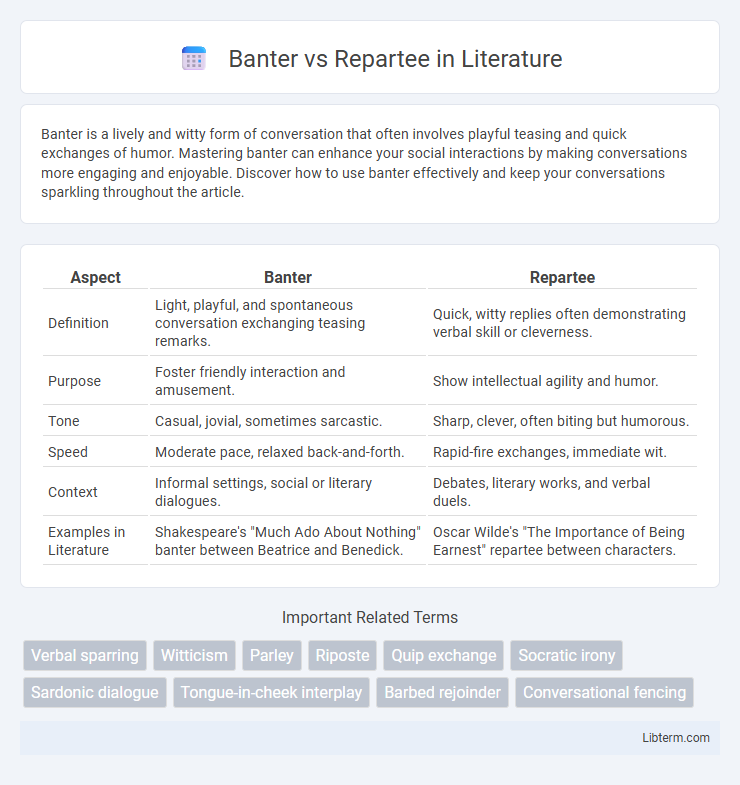Banter is a lively and witty form of conversation that often involves playful teasing and quick exchanges of humor. Mastering banter can enhance your social interactions by making conversations more engaging and enjoyable. Discover how to use banter effectively and keep your conversations sparkling throughout the article.
Table of Comparison
| Aspect | Banter | Repartee |
|---|---|---|
| Definition | Light, playful, and spontaneous conversation exchanging teasing remarks. | Quick, witty replies often demonstrating verbal skill or cleverness. |
| Purpose | Foster friendly interaction and amusement. | Show intellectual agility and humor. |
| Tone | Casual, jovial, sometimes sarcastic. | Sharp, clever, often biting but humorous. |
| Speed | Moderate pace, relaxed back-and-forth. | Rapid-fire exchanges, immediate wit. |
| Context | Informal settings, social or literary dialogues. | Debates, literary works, and verbal duels. |
| Examples in Literature | Shakespeare's "Much Ado About Nothing" banter between Beatrice and Benedick. | Oscar Wilde's "The Importance of Being Earnest" repartee between characters. |
Understanding Banter and Repartee
Banter involves light, playful exchanges often characterized by teasing and humorous remarks that create a relaxed and friendly atmosphere. Repartee emphasizes quick, witty responses that demonstrate sharp intellect and verbal agility in conversation. Both banter and repartee enhance social interactions by fostering engagement and entertaining dialogue.
Key Differences Between Banter and Repartee
Banter involves light, playful exchange often characterized by teasing and humorous remarks, typically casual and spontaneous in nature. Repartee emphasizes quick-witted, sharp responses that demonstrate verbal skill and intellectual agility, often in a more refined or intellectual context. Key differences include tone--banter is more teasing and informal, while repartee requires cleverness and is usually more structured and pointed.
Origins and Etymology
Banter originates from the mid-18th century, derived from the Old French word "bantir," meaning to tease or mock, reflecting light-hearted, playful exchange. Repartee traces back to the early 17th century, stemming from the French "repartir," meaning to reply or counter quickly, emphasizing swift, witty retorts. Both terms showcase linguistic evolution rooted in social interaction, highlighting distinct but related forms of conversational wit.
Social Contexts for Banter and Repartee
Banter thrives in informal social settings where quick, playful exchanges foster camaraderie and ease group dynamics. Repartee, characterized by sharp wit and rapid retorts, often emerges in more formal or intellectual environments, showcasing verbal agility to impress or challenge others. Both forms enhance social interactions but differ in tone and intent based on context and participants' relationships.
Psychological Impact of Banter vs. Repartee
Banter fosters a lighthearted social atmosphere that enhances bonding and reduces stress through playful exchanges, promoting positive emotions and group cohesion. Repartee, characterized by quick-witted and intelligent responses, stimulates cognitive engagement and sharpens mental agility, often boosting self-esteem and reinforcing social dominance. Both forms of verbal interaction contribute to psychological wellbeing but operate differently: banter emphasizes emotional connection, while repartee highlights intellectual interaction.
Banter in Friendship and Relationships
Banter in friendship and relationships fosters playful communication that strengthens emotional bonds and encourages mutual understanding. Quick-witted exchanges during banter create a lighthearted atmosphere, promoting trust and intimacy between individuals. Unlike repartee, which often aims for clever retorts, banter emphasizes ongoing, spontaneous dialogue that enhances connection and enjoyment.
Repartee in Professional and Social Settings
Repartee in professional and social settings showcases quick wit and intelligent humor that fosters rapport and eases tension. This skill enhances communication by making interactions engaging and memorable, often reflecting confidence and emotional intelligence. Unlike banter, which can be more casual and playful, repartee requires sharp timing and verbal agility tailored to context and audience.
Common Misconceptions
Banter is often mistaken for quick wit, but it primarily involves light-hearted, playful exchanges that build social rapport, whereas repartee emphasizes sharp, immediate verbal comebacks showcasing intellectual agility. A common misconception is that banter lacks depth; however, it relies on mutual understanding and timing to create humor, unlike repartee which is prized for its cleverness and precision. Many confuse repartee with debate, yet repartee aims to entertain through cleverness without the argumentative intent found in formal discussions.
Enhancing Communication Skills with Banter and Repartee
Banter and repartee sharpen quick thinking and verbal agility, essential for effective communication. Engaging in playful banter fosters confidence in spontaneous conversations, while repartee enhances wit and the ability to respond sharply and relevantly. Mastering these skills improves social interactions, making communication more dynamic and memorable.
Tips for Mastering Banter and Repartee
Mastering banter and repartee requires quick wit, active listening, and a keen understanding of humor nuances. Practice by engaging in spontaneous conversations, observing comedic timing, and responding playfully without offending. Emphasize brevity and relevance to keep exchanges lively and meaningful while developing confidence in verbal agility.
Banter Infographic

 libterm.com
libterm.com